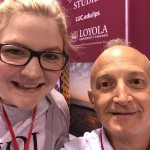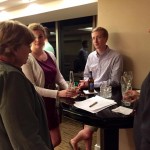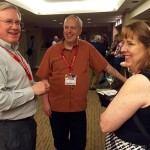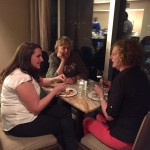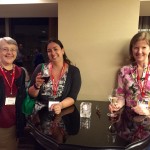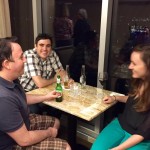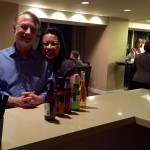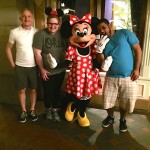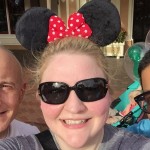Loyola Professor Emeritus Peter Gilmour was the 2014 Aggiormento Award winner for the Institute of Pastoral Studies. Gilmour has been involved with IPS since the program began in 1964 and received the award during IPS’s 50th anniversary celebration last year.
This year, Gilmour finished his article that draws on his 50 years of history with IPS and examines how religious education has changed over the course of time. Gilmour’s article, titled “Educating the Educators: A Fifty-Year Retrospective of Religious Education in the Catholic Context,” was recently published in the Religious Education Association’s journal.
“This article is a retrospective that talks about how we got to the point that we are in today. What I would like to see the readers think about after they’ve read the article is, ‘what happens to a professional discipline when people stop having that as their focus of their graduate studies and other aspects of theology become their focus?’ It has to change the discipline somehow and it has to change the practice of what’s going on and I think that’s a very important thing for people to really consider,” said Gilmour.
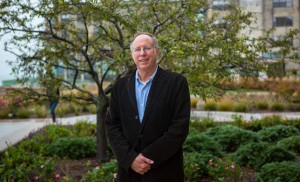
The Abstract reads:
The progressive spirit of the Second Vatican Council (1962–1965) spawned a myriad of graduate departments of religious education in American Catholic colleges and universities. These departments evolved to include other master degrees (e.g., pastoral studies, pastoral counseling, divinity, spirituality, and social justice). As the numbers of students in religious education degree programs significantly diminished, the degree designation in religious education was often terminated. Today, an ever increasing number of religious education practitioners in the Catholic context do not have graduate degrees in religious education. This ongoing reality significantly alters the field of religious education and its practice in the Catholic context.
Gilmour received his Master’s of Religious Education degree from IPS. “The Master’s of Religious Education was the first degree and only degree offered by the Institute for the first 10 years or so,” noted Gilmour.
Eventually, he taught religious education courses and has been a part of various professional organizations that allowed him to make connections with other religious educators from around the world. During his many years of teaching, he also wrote textbooks and teachers’ manuals. Gilmour said that religious education has “been a professional and life long interest.”
“Since I’ve been associated with IPS… I have always been very interested in not only what I did here, but, now, the history of what I did.”
During IPS’s 50th year, Director Brian Schmisek asked Gilmour to consider composing a history of IPS. Gilmour ended up creating the history and he said his current article “grew out” of that project.
“Since this was one of my areas of expertise, I could go into much more detail, I knew much more detail that was not appropriate for the general history, but was appropriate for the article.”
Gilmour explained that religious education, as a professional discipline, has changed greatly over the past 50 years.
“I thought it would be really interesting to explore the whys and the wherefores behind all these changes, starting with the excitement of the Second Vatican Council in the 1960s and progressing right up to the present day.”
He went on to explain that graduate programs that focused on religious education blossomed during and shortly after Vatican II, but as years passed by less and less students were enrolling in such programs. In addition, people with a religious education degree were becoming more interested in parish ministry, rather than teaching in formal Catholic schools. Today, the profession of religious education is populated with people holding a master’s degree in theological studies, but not specifically religious education.
For his research article, Gilmour chose Loyola IPS as the subject for his case study for obvious reasons. Moreover, after he spoke with colleagues and professors from different universities and associations, he learned that IPS was a fair representative of similar programs offered elsewhere.
Since conducting his case study, Gilmour discovered some interesting things.
“Many ministerial programs, like IPS, have closed around the country that, at one time, had degrees in religious education. They never went on and developed other degrees, and they never necessarily changed as much as IPS has. It really struck me how one of the reasons that IPS is here today, and one of the reasons that IPS is successful today, is that IPS has always been willing to change. IPS has always had its fingers on the pulse of what’s going on in church and ministry and has responded to that in very decisive and very creative ways. Looking at the bigger picture of ministerial studies at IPS, I realize just how important change has been in our 50 year history.”
Gilmour said he wrote this article because it was about a topic he knew intimately and now, he challenges other professors to do the same in the areas of their expertise.
“I would actually like to see other people at IPS, meaning faculty, take the other degrees and write a similar history because I think it’s really important that we preserve the kind of history that has gone on here for more than 50 years. I’d love to see someone do that with the Master of Divinity degree, I’d love to see someone do that with a Pastoral Counseling degree because those degrees now are more than 25 years old now. A Pastoral Studies degree would be another one interesting to have a historical retrospective on. With some of these newer degrees there might not have been yet enough time to write such an article, but off in the future I would love to see somebody take those on because I think that preserving the history and telling the history is important. But I’m going to leave that to other people.”
Join the conversation by following @BrianSchmisek on Twitter and @LoyolaIPS on Instagram! Also, network with the Loyola Chicago IPS community on LinkedIn.





